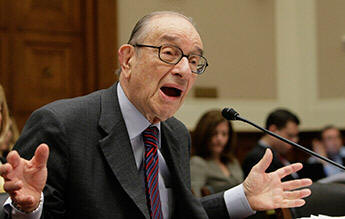Greenspan Gets It (Why Not Others?)

Former Federal Reserve Chairman Alan Greenspan testifies on Capitol Hill in Washington, Wednesday, April 7, 2010, before the Financial Crisis Inquiry...
Regulation: Sometimes, long after their public careers are done, those once in power speak openly about the past. Like Alan Greenspan, who on Wednesday told Congress what he could never tell them while in office.
Testifying before the Financial Crisis Inquiry Commission, the former Fed chairman told some plain truths he didn't dare utter when he headed the central bank. Most notably, Greenspan implied it was Congress' meddling incompetence — not the Fed, or free markets, or greedy bankers — that created the financial meltdown.
"If the Fed as a regulator had tried to thwart what everyone perceived as a fairly broad consensus that the trend was in the right direction, homeownership was rising and that was an unmitigated good, then Congress would have clamped down on us," he said.
That, of course, is dead right. But the maestro wasn't finished.
"There's a presumption that the Federal Reserve's an independent agency, and it is up to a point, but we are a creature of Congress and if ... we had said we're running into a bubble and we need to retrench, the Congress would say 'we haven't a clue what you're talking about,'" he said.
Indeed, that's precisely what happened.
Yes, the Fed may have kept interest rates too low for too long in the middle of this decade. But it also might be true that it had no other real choice — given the sluggish recovery following the 2000 stock market meltdown, the 2001 recession and the 9/11 attacks.
Regardless, it wasn't the Fed that caused the housing crash and financial meltdown. It was Congress and the White House.
The mess began in the 1970s when, during the Carter administration, left-wing activists attacked banks for supposed "redlining" practices that let them discriminate in making home loans.
In response, Congress passed the Community Reinvestment Act, which gave regulators the power to force banks to lend money to "low-income, minority, and distressed neighborhoods."
To fund all this new lending, they used two little-known government-sponsored enterprises — Fannie Mae and Freddie Mac — and essentially rewrote credit standards for the banks, weakening them substantially. Banks made loans, then Fannie and Freddie bought them — using borrowed money to do it.
In this environment, credit ratings no longer mattered much. Neither did having a job or a steady income. What mattered was race.
The process got supercharged in 1992, when a Democrat-led Congress pushed Fannie and Freddie to buy even more mortgages from banks that had made loans to low-income and minority buyers. In 1996, President Clinton's Department of Housing and Urban Development told Fannie and Freddie that 42% of their financing had to go to those with incomes below the median.
By 2000, HUD Secretary Andrew Cuomo proudly unveiled "new regulations" to "provide $2.4 trillion in mortgages for affordable housing for 28.1 million families." Despite subsequent efforts at reform, Democrats in Congress — led by Sen. Chris Dodd and Rep. Barney Frank — rejected major changes to Fannie and Freddie.
We're still paying for that today. Fannie and Freddie have gotten a blank check from the government for their losses, and still owe more than $5 trillion that they can't pay off.
We've been critical of Greenspan in the past, but on this, he's
completely right. The biggest villain in the whole financial meltdown isn't
the "private sector," as some in Congress — like Rep. Frank — have tried to
claim. It's Congress itself.